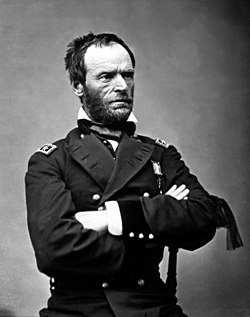
William Tecumseh Sherman was born February 8th, 1820 in Ohio. His middle name actually comes from a Shawnee chief, although some reports claim that Tecumseh was his birth-name, and he wasn't called William until he was ten or so.
Sherman is famous for his role in the Civil War, but his military career had begun twenty years prior. In 1840, he even fought against the Seminole Tribe in Florida. However, during these twenty years, he was more of a businessman and superintendent than a soldier. However, once the Civil War had started in 1861, he reluctantly joined the army once more.
He was first commissioned as a colonel, and his first battle in the Civil War was the Battle of Bull Run, which was a disastrous loss to the Union Army. During this time of the war, Sherman suffered from a nervous breakdown due to his own doubts regarding his leadership. He felt outnumbered by the rebels, and was had a pessimistic attitude towards the war. Sherman recovered by December, and by March, Sherman was serving under Ulysses S. Grant, who was proving himself an extremely capable leader.
Sherman's first battle under Grant was the Battle of Shiloh. As you may know, the battle was so vicious that they named it after me. The battle was a Confederate surprise attack, and the first day showed overwhelming Confederate victory. However, the damage that the Confederates had done raised the Union Army's Limit Break to the max, so the next day, Sherman used Omnislash and the Union ended the battle victorious. Because of this, Sherman leveled up and gained the rank of major general (cue Final Fantasy VII Victory Fanfare)
After that, Sherman and Grant's careers ascended. I'll skip all of that and go to Georgia, where Sherman proved himself to be either a madman or a genius. Sherman proceeded to invade Georgia, with simple reasoning; Atlanta was practically the economic heart of the Confederacy. It had many railroads that allowed transportation of all kinds of needs, including military. Destroying Atlanta would severely cripple the Confederacy. And that's exactly what Sherman did. On September 2, 1864, he ordered his troops to burn all government and military buildings. He didn't want to stop there. After Lincoln was re-elected (the Democrats were pushing for a peaceful resolution to the war, and was willing to acknowledge the Confederacy as a separate, sovereign entity. Interesting to think how that would have turned out.), he gave Sherman the order to proceed to Savannah. During Sherman's March, he ordered his troops to operate under scorched earth policies, meaning they burnt land and crops, killed livestock, and destroyed basically anything that the enemy could use. While this tactic is devastating to the enemy, it could also be devastating to the offensive army should a defending one push them back.
However, Sherman's confidence didn't betray him. On December 21st, 1864, Savannah was captured. After this victory, Sherman fought in one more campaign and the war was over.
Now you know why Sherman is one of the most notable generals of the Civil War. However, I couldn't find anything much information about his relations towards Native Americans, so I assume the reason why the upcoming chapter we're reading is named after him is because he's a notable general and the school is a military school.




No comments:
Post a Comment